Winter Is Coming: Mark Burnett, Roma Downey Launch $25 Million Plan To Help Christians in Iraq and Syria
Powerhouse TV Christian couple partner with Muslim king to address 'crisis in the cradle of Christianity.'
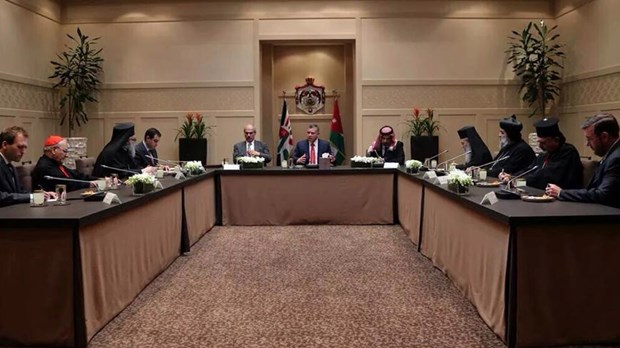 Courtesy of IGE
Courtesy of IGE
Chris Seiple and Johnnie Moore meet with King Abdullah II of Jordan and Eastern patriarchs.
Walking the streets of Irbil, Johnnie Moore was struck by what he saw.
"Christians were everywhere: on the streets, in abandoned buildings, in
canvas tents that are not water-proof or winterized," the former
Liberty University chaplain and spokesman wrote of his visit last week
to Iraqi Kurdistan. "Having survived eradication by terror groups, they now might die naturally from the coming harsh winter."
Moore, who now serves as chief of staff for Mark Burnett and Roma
Downey, announced yesterday that the powerhouse TV Christian couple are
raising $25 million to partner with a Muslim king and help Iraqi and
Syrian Christians (as well as other minorities) displaced by ISIS survive the coming winter.
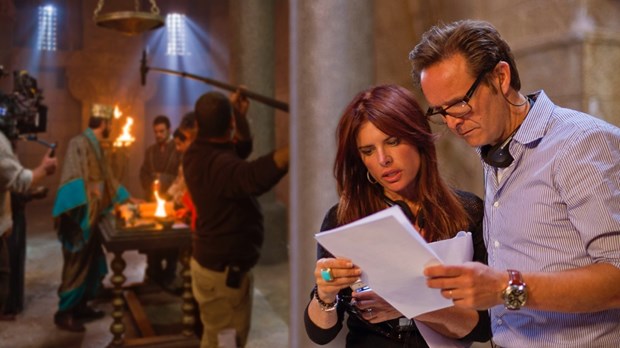 Image: Courtesy of LightWorkers Media
Image: Courtesy of LightWorkers Media
Burnett and Downey on the set of The Bible miniseries.
They've already donated the first $1 million toward a refugee crisis compared to the Rwanda genocide. The United Nations reports 800,000 people urgently need shelter and 2.8 million urgently need food.
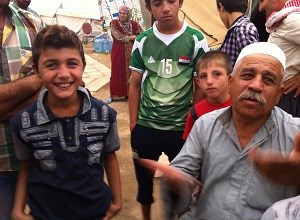 Image: Courtesy of IGE
Image: Courtesy of IGE
Members of Kakai religious community live in refugee camps following the ISIS invasion.
"Having fled their home
with nothing but the clothes on their backs, and having seen
unspeakable things, these brothers and sisters in Christ are severely
traumatized, mostly without shelter," wrote Moore.
"Things are very urgent. We have to move fast," he continued. "Winter is coming. This week’s rain will soon be snow."
Their "Cradle of Christianity Fund"
is being administered by the Institute for Global Engagement (IGE), a
leader on international religious freedom issues which primarily works
in east Asia.
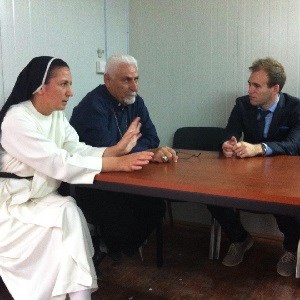 Image: Courtesy of IGE
Image: Courtesy of IGE
Sister Diana and the Syrian Catholic Archbishop of Mosul, Yohanna Petros Mouche.
"To lose the presence of Christians in the birthplace of Christianity is to accelerate instability, while losing precious insight about how best to work in the region," wrote IGE director Chris Seiple in announcing the initiative. "With the region on the brink, a strategy to rescue, restore, and return fleeing Christians is not only the right thing to do, it is in everyone’s interest to do so."
As part of their "needs assessment"
of displaced Christians, Seiple and Moore were invited to meet with
King Abdullah II of Jordan and the patriarchs of the historic Eastern
churches in the region. Abdullah "has been outspoken on the need to keep
Christians in the region as integral to a Middle Eastern identity,"
wrote Seiple. "We agreed to work together, in support of the Ancient
Churches, in this time."
"Donations will go through the churches directly to those who need it
the most, and primarily through the Ancient Churches," explained Moore.
"They know their communities best, where they are and their needs. We
will also work to identify and vet other partners as we go."
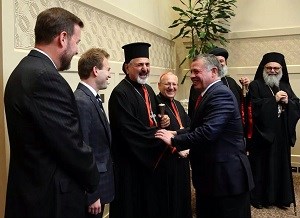 Image: Courtesy of IGE
Image: Courtesy of IGE
King Abdullah II meets with regional and international Christian leaders.
Middle Eastern evangelicals are already exchanging strategies on how to help endangered Christian communities. But this $25 million effort is the first of its scale.
The first phase of the IGE and Burnett-Downey "Rescue, Restore, and Return" plan is as follows:
During the Rescue phase of this plan, The Cradle of Christianity Fund will work primarily with the Ancient Churches to: (1) inject a cash infusion to select Iraqi and Syrian churches because they know their communities best and can identity which families are in greatest need; and, (2) provide winterized, waterproof shelter. Also, we will simultaneously begin our Restore phase, using a small amount of money to establish a “Documentation of Truth” center to record the atrocities committed against Christians, and others, over the last several months while also recording stories of hope, courage, and partnership between Christians and those Muslims who love peace and tried to protect their neighbors.
Burnett and Downey "wanted to do something for religious
freedom—now—focused on the plight of Christians, but serving people of
all faiths/none," Seiple explained. "They were also acutely aware of how
complex this region and issues are. We agreed to partner together, and
that whatever we did, we would act in a manner that: 1) honored God; 2)
was multi-faith/non-proselytizing; and, 3) was at the invitation of
regional leaders."
Seiple noted:
While I had been to the region many times—our Center for Women, Faith & Leadership, for example, grew out of our partnership with an all-women’s college in Hama, Syria—I never fully appreciated the practical role that Christians play in the Middle East. In general, their millennia presence, through their example of loving all neighbors, contributes to the spiritual and social well-being of societies across the Middle East (not least through well-educated leaders in government and the academy, serving all citizens). As such, they are a bridge between and among different faiths, and traditions within those faiths. Such action, if allowed to flourish, strengthens society by preventing stereotypes that might be manipulated by terrorists; indeed, loving neighbor enhances the stability of the state. Equally important, though, Christians in the Middle East serve as a bridge back to Christian-majority countries, helping people like me to better understand their region, and how best to come alongside the people who live there, in support of their solutions.
Moore noted:
That hope is taking tangible form through the leadership of Jordan's King Abdullah II. The King has repeatedly stated in public that Christians are integral to the identity, well-being, and stability of Jordan, and the region (which means a great deal, given that the King is recognized as a direct descendant of Mohammed). His leadership is showing us how to get help to the right people, immediately. He and Prince Ghazi (the King’s personal envoy and advisor for religious and cultural affairs), are also helping us vet and hold our partners accountable. Jordan has also now taken in more than 4000 Christians themselves, housing them in church communities.
Here is the full plan from Seiple and Moore and a travelogue with photos of their trip. Those interested in donating can learn more here.
CT recently reported how Middle Eastern evangelicals are exchanging strategies on ISIS, different views between American and Egyptian Christians on how to support Christianity's historical heartland, and a Mosul Christian's appreciation for "changing your #WeAreN photo." CT also editorialized why ISIS must be stopped, but no special pleading on behalf of Christians is required.
CT reported how ISIS took over Iraq's Christian heartland, evicting Christians from the second-largest city of Mosul and seizing the "Christian capital" of Qaraqosh. CT reported from Jordan on Syria's refugee crisis.
Here is the full release:
Crisis in the Cradle of Christianity: A Strategy to Rescue, Restore & Return
by Chris SeipleGlobal Friends of all faiths and none,
As you probably know, I and my organization (IGE), work for people everywhere to have an opportunity to believe freely, whatever they want to believe. We do so as a function of our Christian faith, fiercely independent, in a “3NP” manner: non-profit, non-partisan & non-proselytizing. Our theory of change takes a long-term perspective, seeking to catalyze and convene a sustainable safe space where all can bring their beliefs and values to the public square, as well as the public policy table. For example, our most recent innovation will equip women leaders toward this change, as the only thing less included in international affairs is women of faith. We work primarily in the Eastern half of Asia.Every once in a while, events collude and challenge your paradigm…what if we were to work in the short-term outside our current regional focus?
Seven weeks ago I got a call from Mark Burnett and Roma Downey. They are Christians who have a heart for the Christians of the Middle East, especially in the Levant/Iraq. They also happen to be movie and TV producers. They wanted to do something for religious freedom—NOW—focused on the plight of Christians, but serving people of all faiths/none. They were also acutely aware of how complex this region and issues are. We agreed to partner together, and that whatever we did, we would act in a manner that: 1) honored God; 2) was multi-faith/non-proselytizing; and, 3) was at the invitation of regional leaders.
While I had been to the region many times—our Center for Women, Faith & Leadership, for example, grew out of our partnership with an all-women’s college in Hama, Syria—I never fully appreciated the practical role that Christians play in the Middle East. In general, their millennia presence, through their example of loving all neighbors, contributes to the spiritual and social well-being of societies across the Middle East (not least through well-educated leaders in government and the academy, serving all citizens). As such, they are a bridge between and among different faiths, and traditions within those faiths. Such action, if allowed to flourish, strengthens society by preventing stereotypes that might be manipulated by terrorists; indeed, loving neighbor enhances the stability of the state. Equally important, though, Christians in the Middle East serve as a bridge back to Christian-majority countries, helping people like me to better understand their region, and how best to come alongside the people who live there, in support of their solutions.
To lose the presence of Christians in the birthplace of Christianity is to accelerate instability, while losing precious insight about how best to work in the region. With the region on the brink, a strategy to rescue, restore, and return fleeing Christians is not only the right thing to do, it is in everyone’s interest to do so.
Last week, I traveled with Mark and Roma’s Chief of Staff, Johnnie Moore, to Iraqi Kurdistan and Jordan. Below is a summary note from Johnnie to our fellow Christians in America. Attached is our strategy for moving forward (along with some of my ownFacebook pictures that I posted as we traveled). On behalf of, and in partnership with, Mark & Roma, I ask that you think about how you might help.
Yesterday I had a long-overdue lunch with some friends of mine who happen to be Muslim. To my great surprise, I learned that all of them are from Mosul (in northern Iraq, now the terrorists’ state capital from which all the Christians have fled). They spoke of a different time. Some had grown up in the Christian quarter of Mosul, remembering fondly the local Church as “mother” and “father” to kids in the neighborhood. They also spoke of how the prophet Jonah—so vital to each of the Abrahamic traditions, and whose tomb is in Mosul—was an ingrained and revered part of their culture.
It is this narrative that we must recover…together…in the Middle East…and worldwide. Certainly, we will have irreconcilable theological and political positions. That is normal. But how wonderful it would be, for example, if Muslims and Christians in America worked together on behalf of the beleaguered refugee Christians (and others, to be sure) in the Middle East. How wonderful it would be if this partnership were joined by other faith traditions, worldwide, as we refused to be defined against our neighbor. How wonderful if this practical coalition began to work in other parts of the world. We are all minorities somewhere.
Finally, I should note that our trip last week ended with an invitation from His Majesty, the King of Jordan, Abdullah II—who has been outspoken on the need to keep Christians in the region as integral to a Middle Eastern identity—to meet with the Patriarchs of the Eastern Churches. We agreed to work together, in support of the Ancient Churches, in this time. As I reviewed their assessments of the overwhelming need before all of us, I came across this fundamental understanding of the Church. May it continue to guide us…"The church has never considered itself as a separated body in the society she lives in. Its spiritual message obliges her to meet the spiritual and physical needs to all human beings. For this reason, the chuch has erected many educational and medical services to meet the needs of each human being created in the image of God and in no respect to faith or ethnic affiliations. The church believes that education is the cornerstone in building a society structured on respect and love to others."From: Johnnie Moore
Sent: Wednesday, October 22, 2014 5:30 PM
To: Johnnie Moore; Chris Seiple
Cc: Mark Burnett; Roma Downey
Subject: From Mark Burnett & Roma Downey's Office (our visit to Iraq, & a personal request)
Dear Friends,
On behalf of Mark and Roma, Dr. Chris Seiple and I have just returned from Iraq and Jordan, where we conducted a needs assessment of the Christians who survived the attempted genocide against them.
Having fled their home with nothing but the clothes on their backs, and having seen unspeakable things, these brothers and sisters in Christ are severely traumatized, mostly without shelter, and winter is coming.
Their suffering is immense.
This email is partially a report, a plan of emergency action, and includes some quotes from “on-the-ground.”
Our goal is to raise an initial $25-million to help these hundreds-of-thousands of Christians and their communities survive through the winter, even as we try to attract the international media to their awful situation.
In short, it was decided in Amman—where the King of Jordan His Majesty King Abdullah II convened the Patriarchs of the Ancient Churches of the East—that we should come alongside those Churches, helping them to save these 2000 year old Christian communities…before winter comes.
Donations will go through the churches directly to those who need it the most, and primarily through the Ancient Churches. They know their communities best, where they are and their needs. We will also work to identify and vet other partners as we go.
The need is simply overwhelming. There are over 800,000 displaced people in Kurdistan alone. According to the UN, if it operates at 100% efficiency, it can only take care of 40% of these desperate people.
As we walked the streets of Irbil, Christians were everywhere…on the streets, in abandoned buildings, in canvas tents that are not water-proof or winterized. Having survived eradication by terror groups, they now might die naturally from the coming harsh winter.
We really need to raise an initial $25 million urgently to get aid in hand before winter. Graciously, Mark & Roma have already donated the first million to establish what we’re calling “The Cradle of Christianity Fund.” You can give here:http://globalengage.org/support-ccf.
As you probably know, Christian homes across northern Iraq were marked with the Arabic letter “N” for “Nasrani/Nazarene” (i.e. Nazareth, the hometown of Jesus and of Jonah). Our brothers and sisters in Christ were given a “choice:” leave, convert, or die. Not much of a choice. All of this seems like Nazi Germany.
For example, in the northern Iraqi town of Mosul (where Jonah is buried), most fled in the middle of the night, before the evil arrived, with nothing but the clothes on their backs. And now winter is coming.
For the first time since the 4th Century—when a monk named Matthew fled Roman persecution and established a monastery in Mosul—there is no Church in Mosul. Make no mistake, this is evil’s goal for the region…a goal that will be achieved if good people do nothing.
And winter is coming.
The red-bearded Metropolitan of the Syriac Orthodox Church in Mosul, Nicodemus Daoud Matti Sharaf, told us: “I am an Archbishop and I have no churches. And I have no scriptures.” Mosul’s Sister Diana shared that, "If we had stayed they would have done to us what they would have done everywhere else: bury women alive, or sell them into slavery, while taking the young boys to the madrassas. We feel like we are living a nightmare. We wake up every morning and wonder if this is true?"
And the Syrian Catholic Archbishop of Mosul, Yohanna Petros Mouche (with Sister Diana), asked us with gentle desperation: "If you cannot help us go home, help us to live with dignity. We need help so people can have honor. Winter is coming.”
We also encountered hope in the words of Zena, a 20 year-old from Mosul, who explained to us: "They took our future. They destroyed our church. They took everything from our homes. We ran from our homes at 1am in the morning, only with the clothes on our back. We thank Jesus one‐thousand times for life. Our Lord Jesus saved us from death. But maybe this is the beginning of our story..."
And in an abandoned mall, amidst the cold concrete, one family was proud to share their future with us: a one-month-old son, Matthew, a persecuted refugee, just like the monk who helped bring Christianity to Mosul in the first place.
That hope is taking tangible form through the leadership of Jordan's King Abdullah II. The King has repeatedly stated in public that Christians are integral to the identity, well-being, and stability of Jordan, and the region (which means a great deal, given that the King is recognized as a direct descendant of Mohammed). His leadership is showing us how to get help to the right people, immediately. He and Prince Ghazi (the King’s personal envoy and advisor for religious and cultural affairs), are also helping us vet and hold our partners accountable. Jordan has also now taken in more than 4000 Christians themselves, housing them in church communities.
While much of our work will be within Iraq and Syria, the King told us personally last week, Jordan will be a “welcoming home and shelter” for Christians. The King further noted that there is a simple choice amidst Islam’s internal fight: extremism or moderation, “we will take the lead in saying what is wrong."
As the Chaldean Catholic Patriarch of Baghdad, Louis Raphael Sako has also made clear: "There has been a fraternal life between Christians and Muslims …Together they built a civilization, cities, and a heritage. It is truly unjust now to treat Christians by rejecting them and throwing them away, considering them as nothing.”
It was very important to us that we were invited by people in the region to do our work, and that we didn’t superimpose ourselves on them. We’re grateful that King Abdullah II has afforded us that invitation at the highest possible level.
Now, things are very urgent.
We have to move fast.
Winter is coming. This week’s rain will soon be snow.
Attached is a brief white paper that, based on what we know now, outlines our “Rescue, Restore and Return” strategy. It is a living document and we will adjust it as we go. We welcome your immediate and ongoing feedback.
During the Rescue phase of this plan, The Cradle of Christianity Fund will work primarily with the Ancient Churches to: (1) inject a cash infusion to select Iraqi and Syrian churches because they know their communities best and can identity which families are in greatest need; and, (2) provide winterized, waterproof shelter. Also, we will simultaneously begin our Restore phase, using a small amount of money to establish a “Documentation of Truth” center to record the atrocities committed against Christians, and others, over the last several months while also recording stories of hope, courage, and partnership between Christians and those Muslims who love peace and tried to protect their neighbors.
If you have any questions, please do not hesitate to ask…we met with the UN in both countries, leaders in government in Iraq and in Jordan (including the King), representatives from all the effected minorities, NGO leaders, and so many refugees and churches leaders.
Again, you can give here (http://globalengage.org/support-ccf), to support The Cradle of Christianity Fund (which will be carefully administered by Dr. Seiple’s Institute for Global Engagement).
Perhaps, you might also encourage your business, organization, church or denomination to take a special collection for the persecuted Church and the communities they serve (for example, the International Day of Prayer for the persecuted church this is Sunday, November 2).
I just cannot overemphasize the urgency to move quickly….they need financial help to provide for these people.
Winter is coming.
If there is to be a new story out of this tragedy and hope for baby Matthew, it will be because we act now in their time of greatest need as we hope someone would act on our behalf.
Please forgive my passion, but I can’t get what I saw there out of my head …
Blessings,
Johnnie


No comments:
Post a Comment